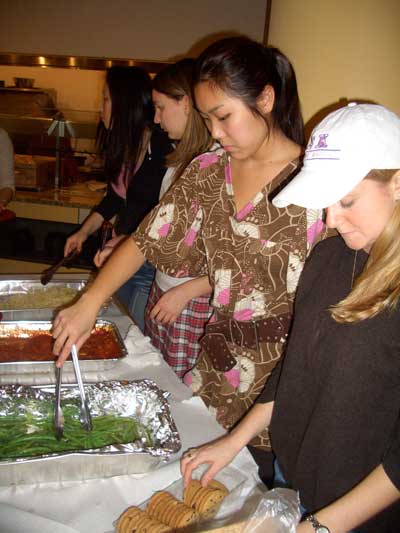Chris Stein ’16: After visiting the University City Hospitality Coalition, Allison Camp ’14 felt enlightened. “Because of UCHC, I see that you can’t always tell by looking at someone that they’re homeless. Hard times can strike anyone.” UCHC was founded by a group of students at the University of Pennsylvania, local residents, and clergymen who were determined that the misery and loss of life that occurs due to the inability to find food or shelter should be eradicated from Philadelphia. Former Director of Community Service Robert Trumbull explained that the people at this organization are “great in that they are non-judgemental of those they serve.” This is achieved, in part, because UCHC’s Board of Directors is comprised not only of donors and good Samaritans, but also of the economically vulnerable and homeless. Episcopal has been involved in UCHC almost since the inception of its Community Outreach Program. Ob Peter ’16 shows why he serves week in and week out by saying, “I just want to help people. This gives me an excellent opportunity to do so.” Episcopal students go to UCHC on Thursdays where, Peter explains, they “serve food to the people there. We pour drinks, and as we do, we talk with them—we get to understand them.” While serving, students can choose a number of tasks, from plating food to pouring drinks. Camp tells us “I always choose to bring out to the tables. The interaction with these people, however brief, is something I cherish. I cherish it because it puts me out of my comfort zone…I can see that we are all equal human beings.” Camp acknowledges that UCHC has had a profound impact on how she views the homeless and on who she is as a person.

Photo courtesy of UCHC
“These intimate, face-to-face encounters are far more impactful then service without an immediate beneficiary,” Susan Swanson, Episcopal’s Director of Community Outreach, states. She continued, “You really get to know the people you are helping after going for so many years.” Leigh Adelizzi, UCHC Co-Project Manager for Community Outreach Board showed how illuminating this service can be: “I like going to UCHC because it gives me a chance to take a break from my busy day and step outside the EA bubble—to help those who need it so close by.” UCHC does much more for University City than serve hot meals to the hungry. They also maintain a medical clinic, a dental clinic, referral services, a legal clinic staffed by University of Pennsylvania law students, and an address that can be used for registering to vote and receive welfare payments. In this, UCHC is far more than a soup kitchen. Their mission is, “To provide direct support services for poor and homeless people, to encourage empowerment and leadership among guests, to facilitate referrals for guests to other agencies when appropriate, and to foster working partnerships between volunteers and guests to create an environment of mutual understanding.” Their success in acting to complete the task they set themselves is unparalleled. Few community organizations can say that they help the number of people that the University City Hospitality Coalition does. Trumbull elucidated, “They do such a vital job in that section of Philadelphia, both through feeding the hungry and through their other programs.”
Swanson also explained that UCHC is a bonding experience for the people who serve: “It is so wonderful to serve with student volunteers; they have such good hearts!” Swanson and countless others have found through their service that, while a sense of obligation may be the impetus for serving, one comes to love and to enjoy helping his or her community. Swanson explained why UCHC is such a wonderful program when she reveals “I like to help people, and I really feel like I am when I give them a warm meal and a warmer smile.”